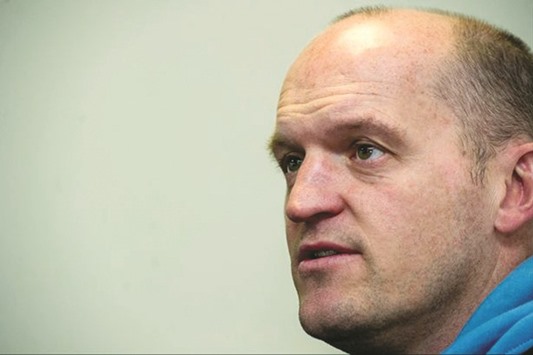Gregor Townsend will replace Vern Cotter as the head coach of the Scotland national side at the end of the 2016/17 season, the Scottish Rugby Union announced yesterday.
New Zealander Cotter’s contract expires in June 2017 and the SRU has now made public its intention to install Townsend, a former Scotland international, into the role when his current deal as head coach of the Glasgow Warriors ends at the same time.
“Gregor’s abilities as a head coach are evident and he is increasingly becoming one of the most sought-after coaches in the game,” said SRU chief executive Mark Dodson in a statement.
Townsend, 43, took charge of Glasgow — one of Scotland’s two professional teams along with Edinburgh — in 2012 after three years as an assistant coach with the national side.
He has since taken Glasgow to the Celtic League play-offs in each of his four seasons in charge and led them to their first title in 2015 after they also topped the regular season table.
“I am incredibly proud to take on the Scotland head coach role at the end of the season,” said Townsend, who won 82 Scotland caps and two for the British and Irish Lions in a playing career where he was best known as a fly-half.
Cotter, 54, took over as Scotland coach in May 2014 after previously being in charge of club side Clermont, with whom he won France’s Top 14 title in 2010.
He nearly took Scotland into the semi-finals of last year’s World Cup only for the team to suffer a heart-breaking quarter-final defeat by Australia following a controversial last-gasp penalty.
Shortly before that tournament, Cotter extended his Scotland contract until 2017.
His first Six Nations saw Scotland lose all five of their matches but this year’s edition saw the team make progress with wins over Italy and France.
But with Cotter’s two immediate predecessors Andy Robinson (England) and more recently, Scott Johnson (Australia), also both coming from outside the country, the SRU believe now is the time to think of appointing a homegrown coach.
“I have been charged with developing Scottish coaches and believe the time is now right to secure Gregor’s talents, as we build towards the 2019 Rugby World Cup in Japan,” Dodson added.
“Vern Cotter has made a considerable impact on the development of the Scotland national side during his tenure. His rugby philosophy of setting high standards with a big emphasis on skill development has had a positive effect throughout Scottish rugby.
“No-one will forget our Rugby World Cup 2015 journey as Vern led the team to the quarter-finals and so nearly a semi-final.
“However the board and I now believe the time is right to take the development of the national team forward with Gregor.
“Gregor’s playing record as a Scotland internationalist and British Lion showed he is a man of vision and great professionalism, which he has since successfully transferred into his coaching roles, firstly with Scotland and subsequently Glasgow Warriors.
“It is these factors which I feel will enable Scotland to continue its forward momentum, building on the strong foundations laid by Vern, with the current group of players and future Scotland internationals.”
Last year’s Six Nations wins are the only two Cotter has managed to guide Scotland to in 10 fixtures in European rugby union’s showpiece international event.
“Since taking up this role I believe we have moved forward as a group by working to execute the simple things well,” Cotter said.
“I intend to remain focused on the upcoming Autumn Internationals and remaining Scotland matches in 2017.”
South African rugby boss Hoskins quits job
AFP/Johannesburg
The president of the South African rugby union, Oregan Hoskins, stepped down yesterday citing the need for change after more than 10 years in charge.
“Being president of SA Rugby has become a full-time job and with my term due to end in 18 months’ time I decided that, after a decade in the job, it was now time to start the next phase of my career,” said Hoskins, announcing his decision at an SA Rugby board meeting.
Rugby in South Africa is under scrutiny in political and non-sporting circles as it comes under pressure to introduce more black players in the white-dominated Springbok team.
The federation has pledged to bring up the numbers of non-white players to half the squad in time for the next Wold Cup in 2019.
In the 2015 World Cup, the team fielded an average of three non-white players per match in a country where blacks represent 80 % of the population. However the change will not come easily because there remains a scarcity of non-white players coming through at club level and challenging for international spots.
Hoskins was elected president of the federation in 2006 and r-elected in 2008, 2010 and 2014.
Under his mandate the country ran out world champions in 2007 and reached the semi-finals in 2015.
Mark Alexander, currently vice president, will take over as interim head until new elections are held.

Former Scotland international Gregor Townsend will coach has been given a new role by the Scotish Rugby Union.
